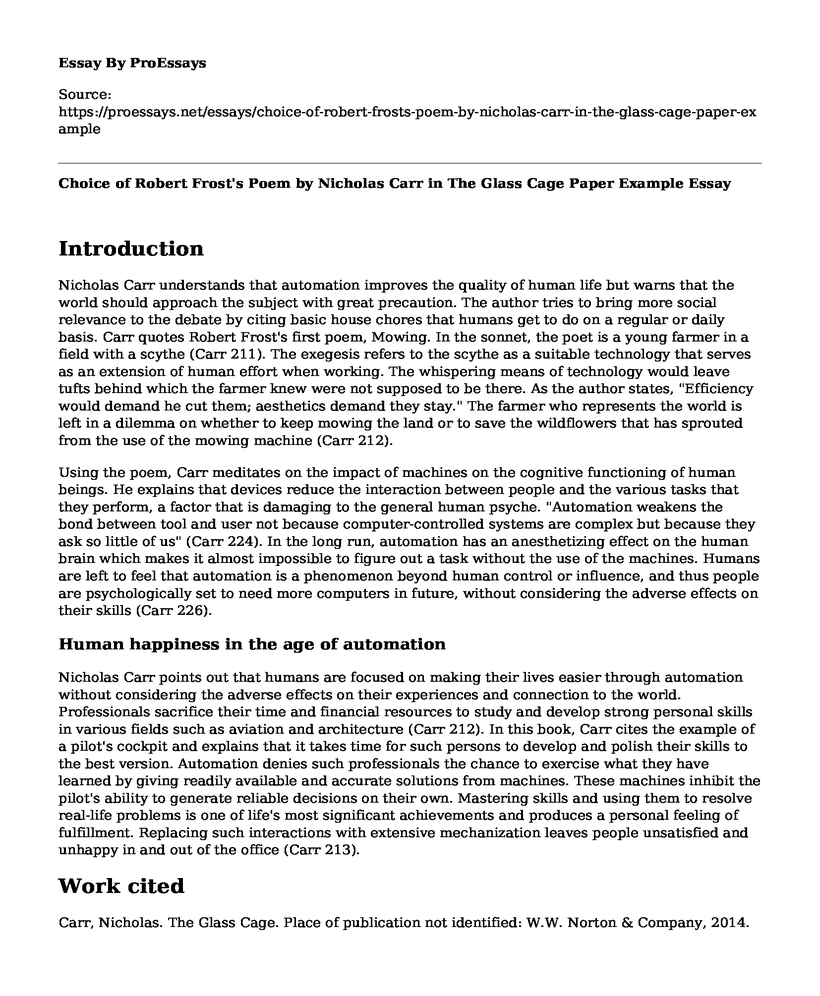Introduction
Nicholas Carr understands that automation improves the quality of human life but warns that the world should approach the subject with great precaution. The author tries to bring more social relevance to the debate by citing basic house chores that humans get to do on a regular or daily basis. Carr quotes Robert Frost's first poem, Mowing. In the sonnet, the poet is a young farmer in a field with a scythe (Carr 211). The exegesis refers to the scythe as a suitable technology that serves as an extension of human effort when working. The whispering means of technology would leave tufts behind which the farmer knew were not supposed to be there. As the author states, "Efficiency would demand he cut them; aesthetics demand they stay." The farmer who represents the world is left in a dilemma on whether to keep mowing the land or to save the wildflowers that has sprouted from the use of the mowing machine (Carr 212).
Using the poem, Carr meditates on the impact of machines on the cognitive functioning of human beings. He explains that devices reduce the interaction between people and the various tasks that they perform, a factor that is damaging to the general human psyche. "Automation weakens the bond between tool and user not because computer-controlled systems are complex but because they ask so little of us" (Carr 224). In the long run, automation has an anesthetizing effect on the human brain which makes it almost impossible to figure out a task without the use of the machines. Humans are left to feel that automation is a phenomenon beyond human control or influence, and thus people are psychologically set to need more computers in future, without considering the adverse effects on their skills (Carr 226).
Human happiness in the age of automation
Nicholas Carr points out that humans are focused on making their lives easier through automation without considering the adverse effects on their experiences and connection to the world. Professionals sacrifice their time and financial resources to study and develop strong personal skills in various fields such as aviation and architecture (Carr 212). In this book, Carr cites the example of a pilot's cockpit and explains that it takes time for such persons to develop and polish their skills to the best version. Automation denies such professionals the chance to exercise what they have learned by giving readily available and accurate solutions from machines. These machines inhibit the pilot's ability to generate reliable decisions on their own. Mastering skills and using them to resolve real-life problems is one of life's most significant achievements and produces a personal feeling of fulfillment. Replacing such interactions with extensive mechanization leaves people unsatisfied and unhappy in and out of the office (Carr 213).
Work cited
Carr, Nicholas. The Glass Cage. Place of publication not identified: W.W. Norton & Company, 2014. Internet resource.
Cite this page
Choice of Robert Frost's Poem by Nicholas Carr in The Glass Cage Paper Example. (2022, Oct 23). Retrieved from https://proessays.net/essays/choice-of-robert-frosts-poem-by-nicholas-carr-in-the-glass-cage-paper-example
If you are the original author of this essay and no longer wish to have it published on the ProEssays website, please click below to request its removal:
- Critical Essay on Killer Angels by Michael Shaara
- The Use of Symbolism in Fahrenheit 451 Essay
- The Differences Between the Book "Iliad" and the Film "Troy" Essay Example
- Grief and Denial: William Faulkner's A Rose for Emily - Research Paper
- Virgil's Epic: Was Turnus' Death Justified? - Essay Sample
- Essay Example on Robert Browning's Dramatic Monologues: The Noble Quest for Precision
- Essay Example on Genni Genn's Versions: A Canadian Novella & Other Stories







